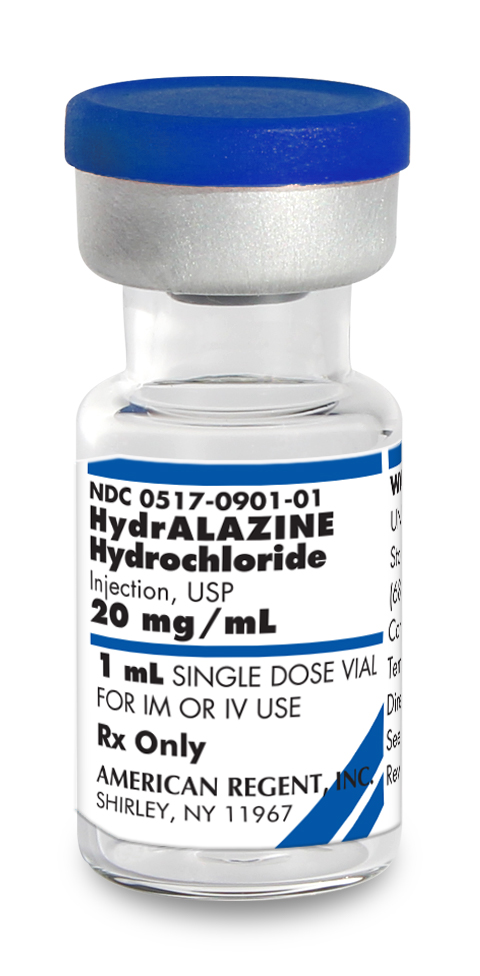Contact Us
By clicking Submit, you confirm that you accept our Privacy Policy and that you agree to your personal contact information being used to contact you and added to our database. If at any time you wish your personal information to be removed from the American Regent® database, please submit a message request to corpcommunications@americanregent.com.
CONTRAINDICATIONS
Hypersensitivity to hydralazine; coronary artery disease; mitral valvular rheumatic heart disease.
WARNINGS
Hydralazine may produce a clinical picture simulating systemic lupus erythematosus, necessitating discontinuation unless the benefit-to-risk determination requires continued antihypertensive therapy with this drug. Symptoms and signs usually regress when the drug is discontinued but residua have been detected many years later.
PRECAUTIONS
General: Myocardial stimulation produced by hydralazine can cause anginal attacks and ECG changes of myocardial ischemia including myocardial infarction.
Use with caution in patients with suspected coronary artery disease. The “hyperdynamic” circulation caused by hydralazine may accentuate specific cardiovascular inadequacies. For example, hydralazine may increase pulmonary artery pressure in patients with mitral valvular disease. The drug may reduce the pressor responses to epinephrine. Postural hypotension may result from hydralazine but is less common than with ganglionic blocking agents. It should be used with caution in patients with cerebral vascular accidents.
Peripheral neuritis, evidenced by paresthesia, numbness, and tingling, has been observed.
Laboratory Tests: Complete blood counts and antinuclear antibody titer determinations are indicated before and periodically during prolonged therapy.
Blood dyscrasias have been reported. If such abnormalities develop, therapy should be discontinued.
Drug Interactions: MAO inhibitors should be used with caution in patients receiving hydralazine.
When other potent parenteral antihypertensive drugs, such as diazoxide, are used in combination with hydralazine, patients should be continuously observed for several hours for any excessive fall in blood pressure. Profound hypotensive episodes may occur when diazoxide injection and hydralazine injection are used concomitantly.
Pregnancy: Teratogenic effects. Pregnancy Category C:
Animal studies indicate that hydralazine is teratogenic in mice at 20 to 30 times the maximum daily human dose of 200 to 300 mg, and possibly in rabbits at 10 to 15 times the maximum daily human dose, but that it is nonteratogenic in rats. Teratogenic effects observed were cleft palate and malformations of facial and cranial bones.
There are no adequate and well-controlled studies in pregnant women. Hydralazine should be used during pregnancy only if the expected benefit justifies the potential risk to the fetus.
Nursing Mothers: Hydralazine has been shown to be excreted in breast milk.
Pediatric Use: Safety and effectiveness in pediatric patients have not been established.
ADVERSE REACTIONS
The following adverse reactions have been observed, but there has not been enough systematic collection of data to support an estimate of their frequency.
Common: Headache, anorexia, nausea, vomiting, diarrhea, palpitations, tachycardia, angina pectoris.
Less Frequent:
Digestive: constipation, paralytic ileus.
Cardiovascular: hypotension, paradoxical pressor response, edema.
Respiratory: dyspnea.
Neurologic: peripheral neuritis, dizziness, tremors, muscle cramps, psychotic reactions characterized by depression, disorientation, or anxiety.
Genitourinary: difficulty in urination.
Hematologic: blood dyscrasias, consisting of reduction in hemoglobin and red cell count, leukopenia, agranulocytosis, purpura; lymphadenopathy; splenomegaly.
Hypersensitive Reactions: rash, urticaria, pruritus, fever, chills, arthralgia, eosinophilia, and rarely, hepatitis.
Other: nasal congestion, flushing, lacrimation, conjunctivitis.
INDICATIONS AND USAGE
Severe essential hypertension when the drug cannot be given orally or when there is an urgent need to lower blood pressure.
For additional safety information, please see Full Prescribing Information.
You are encouraged to report Adverse Drug Events to American Regent Inc. at 1-800-734-9236, or to the FDA by visiting www.fda.gov/medwatch or by calling 1-800-FDA-1088.
REF-1505 10/18
